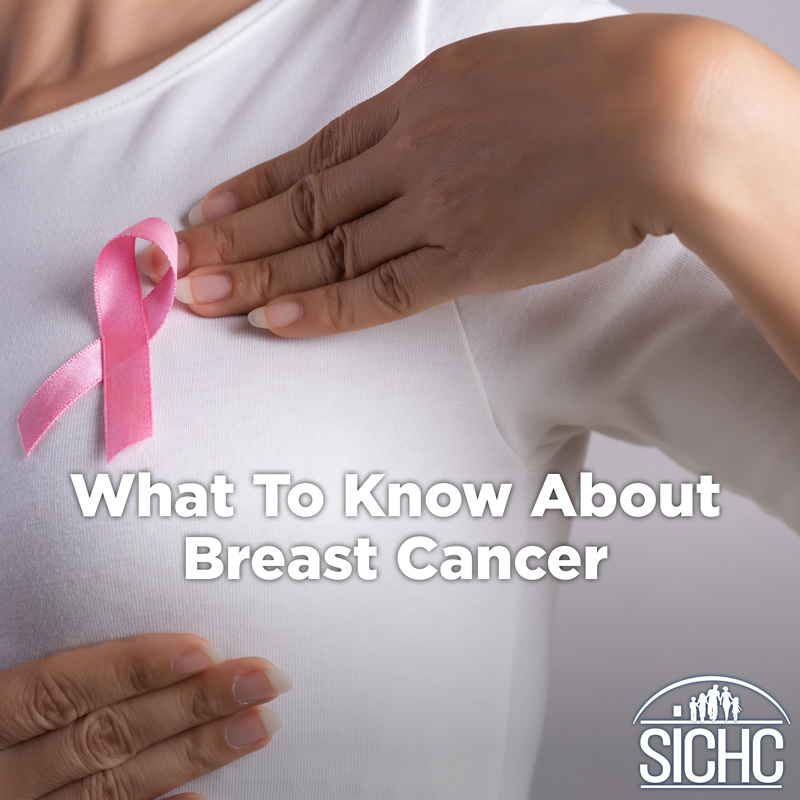What to Know About Breast Cancer

By Melissa Ray, FNP
October is Breast Cancer Awareness Month, and with that in mind, here’s what you should know about breast cancer.
The statistics. According to 2017 statistics, breast cancer ranks first in the list of the new cancer cases for women and second in terms of cancer deaths. It’s estimated that 281,550 new cases of invasive breast cancer and 49,290 new cases of non-invasive (in situ) breast cancer will be diagnosed in women in 2021.
The risk factors. While there are certain lifestyle choices you can make that can help reduce your risk of developing breast cancer, such as not smoking or drinking alcohol, maintaining a healthy weight and being physically active, there are others that you can’t alter, such as your age, your reproductive history and the health background of your family.
Knowing your family medical history, especially in relation to breast or ovarian cancer, can indicate how at risk you are, since about 5% to 10% of breast and 10% to 15% of ovarian cancers are hereditary, according to the CDC.
What about the BRCA1, BRCA2 and PALB2 genes? If any of those three has a mutation, it raises your risk for breast, ovarian and other cancers. And if either of your parents has an abnormal BRCA1, BRCA2 and PALB2 genes, your risk is also greater. The good news is that there is are testing options for these genes as well as other inherited gene mutations now associated with breast cancer risk. Check with your insurance company for coverage, since if you have a family history, the test may be free. (For more information, go to BreastCancer.org’s “What to Do if Your Genetic Test Results Are Positive” at https://www.breastcancer.org/symptoms/testing/genetic/pos_results.)
This is why questions about your family’s health history, especially as it relates to cancer, are included as part of the questionnaire when you visit your health practitioner. (Need help creating a family medical history? Use the CDC’s My Family Health Portrait at https://phgkb.cdc.gov/FHH/html/index.html# to compile your family health history online.)
Screening tests
Regular breast cancer screening can find cancer at an early stage when it is most treatable. While a mammography is the most common screening test for breast cancer, it may be recommended that you undergo a magnetic resonance imaging (MRI) if you are at a high risk of breast cancer.
What if you have dense breasts, meaning your breasts have relatively high amounts of glandular tissue and fibrous connective tissue and relatively low amounts of fatty breast tissue? Your healthcare practitioner may recommend that you have supplemental imaging tests such as 3-D mammography (breast tomosynthesis), ultrasound or an MRI. These tests are covered by insurance in many states.
Treatment options
If you have tested positive for a breast cancer-related gene mutation, discuss with your healthcare provider about ways to reduce your risk of developing breast cancer. These can include taking antiestrogens or other medicines that block or decrease estrogen in your body or undergoing surgery to remove breast tissue, called a prophylactic (preventive) mastectomy.
What if you have been diagnosed with breast cancer? You will undergo further tests to study the cancer cells and determine the best course of treatment, based on how quickly the cancer may grow, how likely it is that the cancer will spread (metastasize) through the body, how well certain treatments might work and how likely the cancer is to recur.
Treatment options include:
- Surgery
- Radiation therapy
- Chemotherapy
- Hormone therapy
- Targeted therapy
- Immunotherapy
You can also discuss with your doctor the possibility of enrolling in a clinical trial.
Free mammograms. SICHC will be offering free mammograms at its 307 South Indiana office in English on November 3, 2021. For more information or to schedule an appointment, call (812) 338-2924.
